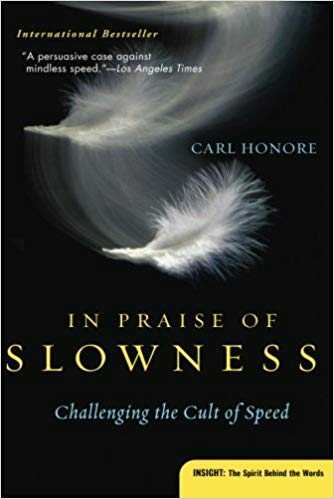In Praise of Slowness: Challenging the Cult of Speed
by: Carl Honore
Check out the book on Amazon | your public library.
21 Highlights | 4 Notes
In 1783, Larry Dossey, an American physician coined the term 'time-sickness' to describe the obsessive belief that 'time is getting away, that there isn't enough of it, and that you must pedal faster and faster to keep up'
The work ethic, which can be healthy in moderation, is getting out of hand.
Boredom - the word itself hardly existed 150 years ago - is a modern invention. Remove all stimulation, and we fidget, panic and look for something, anything, to do to make use of time. When did you last see someone just gazing out the window on a train? Everyone is too busy reading the paper, playing video games, listening to ipods, working on the laptop, yammering into mobile phones.
What is the very first thing you do when you wake up in the morning? … No, the first thing you do, the first thing everyone does is check the time. From its perch on the bedside table, the clock gives us our bearings, telling us not only where we stand vis-a-vis the rest of the day, but also how to respond. … Right from that first waking moment, the clock calls the shots.
Right from the start though, time keeping proved to be a double-edged sword. On the upside, scheduling can make anyone, from peasant farmer to software engineer more efficient. Yet as soon as we start to parcel up time, the tables turn and time takes over.
To teach workers the new time discipline demanded by modern capitalism, the ruling classes set about promoting punctuality as a civic duty and a moral virtue, while denigrating slowness and tardiness as cardinal sins.
Tempted and titillated at every turn, we seek to cram in as much consumption and as many experiences as possible.
The result is a gnawing disconnect between what we want from life and what we can realistically have, which feeds the sense that there is never enough time.
Every aspect of urban life is now recast in line with the Petrini principles - pleasure before profit, human beings before head office, Slowness before speed. The movement was christened Citta Slow, or Slow Cities, and now has more than thirty member towns in Italy and beyond.
A Slow City asks the question: Does this improve our quality of life? If the answer is yes, then the city embraces it.
This brings us back to one of the central questions facing the Slow movement: How do we curb the instinct to accelerate? In driving, as in life, one way is to do less, since a busy schedule is a prime cause of speeding. Another is to learn to feel comfortable with slowness.
“Once you start asking questions about speed, that five-letter word, in the car, then you start asking the same questions about life in general: Why am I in such a hurry? What is the point of rushing to save a minute or two?” he says. “ When you're a calmer driver, you're calmer with your family, your work, with everything. I am a much calmer person in general now.”
Yet living Slowly at home can take the edge off the manic modern workplace.
Even in martial arts such as karate, judo and kendo, with their lightning-fast kicks and punches, combatants learn to maintain a core of slowness. If the mind is racing, if they feel anxious and rushed, they are vulnerable. Through hin own inner stillness, the martial arts expert learns to 'slow down' his opponents' moves in order to counter them more easily. He must be Slow on the inside to be fast on the outside.
Whatever happened to the Age of Leisure? Why are so many of us still working so hard? One reason is money. Everyone needs to earn a living, but the endless hunger for consumer goods means that we need more and more and more cash. So, instead of taking productivity gains in the form of extra time off, we take them in higher incomes.
Winston Churchill delivered the most eloquent defense of the afternoon snooze: “Don't think you will be doing less work because you sleep during the day. That's a foolish notion helped by people who have no imagination. You will be able to accomplish more. You get two days in one - well, at least one and a half.
Thousands of miles away, on the Canadian Prairies, Dale Burnett, a professor of education at the University of Lethbridge has come up with a high-tech version of Slow Reading. Whenever he reads a book of any substance - airport novels need not apply - he keeps a web-based diary. After each reading session, he uploads memorable quotes, and insights, basic details about the plot and characters and any reflections inspired by the text. Burnett still reads the same number of words per minute, but takes two to four times longer to finish a book.
Much better to do fewer things and have time to make the most of them.
Taking a less-is-more approach to my hobbies - no more tennis until my children are older - has eased the pressure to rush.
Unstructured play is the opposite of 'quality time', which implies industry, planning, scheduling and purpose. Unstructured play is digging for worms in the garden, messing about with toys ien the bedroom, building castles with Lego, horsing around with other kids in the playground or just gazing out the window. It is about exploring the world, and your own reaction to it, at your own speed. To an adult used to making every second count, unstructured play looks like wasted time. And our reflec is to fill up those 'empty' slots in the diary with entertaining and enriching activities.
